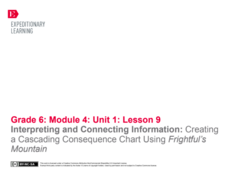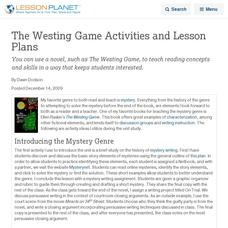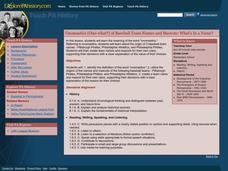EngageNY
Interpreting and Connecting Information: Creating a Cascading Consequence Chart Using Frightful’s Mountain
Decisions, decisions. Scholars take a close look at making decisions by discussing the character Sam in chapters one through eight of Frightful’s Mountain. Partners discuss whether Sam should interact with Frightful and then complete a...
EngageNY
Using Multiple Resources of Information: Creating a Cascading Consequences Chart about DDT and Practicing a Fishbowl Discussion
For every action there is a consequence. Scholars continue their work on creating a cascading consequence chart about DDT using Welcome Back, The Exterminator, Rachel Carson: Sounding the Alarm on Pollution along with graphic organizers...
Curated OER
Brainstorm This!
Students discuss the advantages and types of brainstorming as a prewriting tool. They experiment with different styles of brainstorming and produce prewriting samples for assessment.
Curated OER
Making Connections: I Know Why Caged Birds Sing
Students discuss equality and fairness by reading a Maya Angelo poem. In this U.S. history lesson, students read the poem I Know Why Caged Birds Sing, and discuss how the era it was written in affected the words. Students identify the...
Curated OER
"The Westing Game" Activities and Lesson Plans
You can use a novel, such as "The Westing Game", to teach reading concepts and skills in a way that keeps students interested.
Curated OER
I Oppose!--Counter-argument/Classifying
Students create an effective classification and counter argument. In this counter-argument lesson, students decide upon a label for at least three types of people and then describe their groups. Students describe three types of people...
Curated OER
What's In a Name?
Students explore onomastics. In this baseball history lesson, students create their own team name and explain the name they chose. After choosing a team name students support their choice with revelant reasons and be able to discuss...
Curated OER
The Power of the Pen
Students discuss the personal and historical significance of journals, analyze the issues raised in a N.Y. Times article regarding Anne Frank's diary, and evaluate a Letter to the Editor written in response to the article.
Curated OER
Description and Modifying: What's On Your Plate?
Students create a food product and an advertisement promoting it. In this description and advertising lesson, students read children's book for inspiration and discover advertising techniques. Students complete their ads and use...
Other popular searches
- Persuasive Writing Prompts
- Persuasive Writing 6th Grade
- Persuasive Writing Topics
- Persuasive Writing Template
- Persuasive Writing Unit
- Persuasive Writing Arguments
- Persuasive Writing Lessons
- Writing Technique Persuasive
- Business Persuasive Writing
- Persuasive Essay Segregation
- Persuasive Writing Rubrics
- Persuasive Essay Prompts










